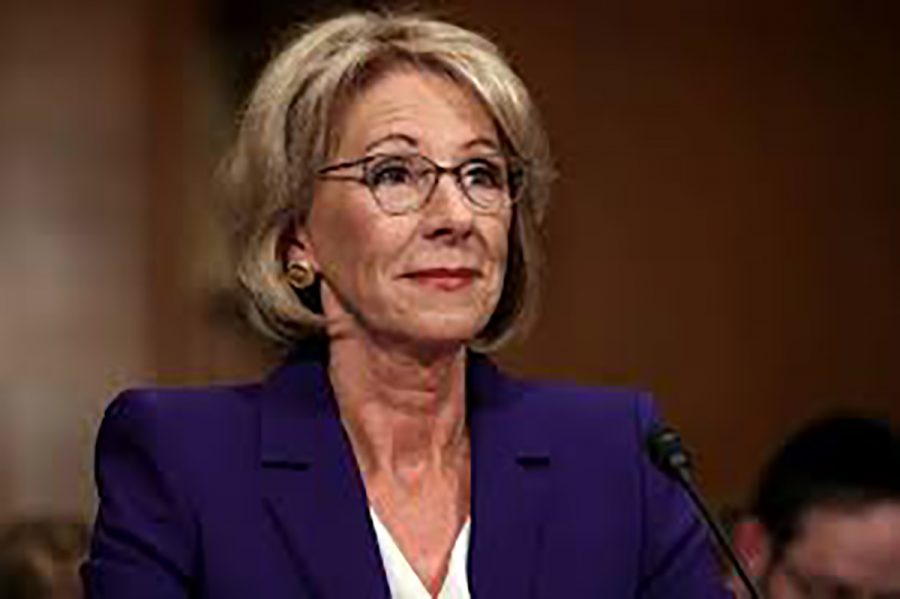Betsy DeVos is secretary of education. What do those vested in public ed have to say?
UW-Eau Claire education studies professors and student respond to DeVos’ confirmation, vouchers and school-choice
More stories from Andee Erickson
Photo by Submitted
Betsy DeVos before the US Senate Committee on Health, Education and Labor Pensions during her hearing on Jan. 17.
When an English education student found out Betsy DeVos had just been confirmed as the new secretary of education she was sitting in a class for her major and they took a moment to acknowledge the news.
The Senate voted DeVos into the position on Tuesday with a historic tie-breaker vote from Vice President Pence after a 50-50 tie in which the 48 Democrats voted against her as did Republican senators Lisa Murkowski of Alaska and Susan Collins of Maine.
Meanwhile, Carly Kuran was attending a class required of education students before they can begin their student teaching, which she plans to do next spring. It’s a crucial step on her mission to becoming an English teacher in a public school someday.
Given the reaction to DeVos’ hearing before the Senate in January, Kuran said she was optimistic DeVos might not get confirmed and that one more Republican senator would respond to constituents opposition and vote against her. Now Kuran said she is already worried about the education of her future students and that the right for everyone to get a full and attentive education will be infringed upon.
“Literacy is a human right but it’s the job of the schools to create contributing, intelligent and aware citizens,” Kuran said.“But Betsy deconstructs that because she wouldn’t provide those resources with her voucher plan.”
DeVos supports President Trump’s campaign proposal to expand charter and private school voucher options using $20 billion in federal funding that would give students living in poverty school choice. It’s an agenda with close ties to Wisconsin, which became home to the nation’s first voucher program after state legislature approved a Milwaukee program in 1989. Not to mention Gov. Scott Walker is also a supporter of school choice and wrote a letter to senators urging them to vote for DeVos.
But what is a voucher? A voucher allows parents to send their children to private schools using state dollars that otherwise would have been spent on the child in public schools, and thus allows parents to decide where their children attend school. So far, only 14 states and D.C. have voucher programs, and this includes Wisconsin.
Assistant English education professor Carey Applegate said she hopes to someday see systematic changes in education, but none of those changes involve more vouchers and school choice.
“I think vouchers tend to help people that don’t need help just as a general rule,” Applegate said. “I like the idea of having lots of options for schools, but what we know about charter schools is they tend not to be assessed at the same level as public schools,” in other words it’s not always clear what their standards are.
But Trump’s $20 billion plan to expand that idea would require approval from Congress and considering how divided Congress is over DeVos, The Washington Post reported that plan is looking less probable.
Although DeVos is still unlike any secretary of education pick before, Applegate also pointed out teachers have not been thrilled with the past two picks under Barack Obama’s presidency. Teachers have often disagreed with past secretaries’ policies, she said, but what’s different with DeVos is her lack of knowledge and experience surrounding public schools as well as her “anti-public school language.”
Associate professor of education studies, Jerry Worley is a strong proponent of public schools and has spent 11 years as a social studies teacher in Montana and 16 years teaching in higher education.
Worley said the road to a productive public education includes authentic teachers who believe in the cause and can foster an environment for their students to experience natural inquiry. He said DeVos’ inexperience with public schools, teachers and parents both as a student and professional is a threat to those values.
“The older I get, the more passionate I am about public school and the more I realize it helped me,” Worley said. If more students leave the public schools on school choice, not only are the remaining students losing peers, he said, they’re also prone to losing the resources as well.
“At least public schools can provide hope and get students thinking about what they want to do with their futures. And it’s free,” Warley said with a pause, “…well besides the taxes.”

